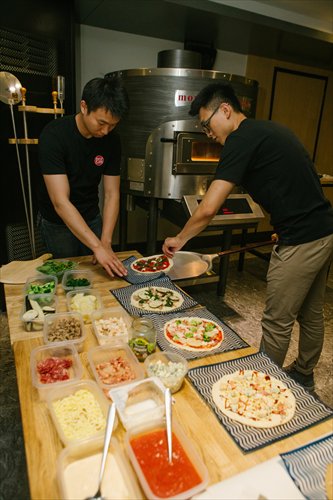Aspiring restaurateurs turn to new methods to start their own eateries in the capital

Chris Xu (left) and Henry Ma, the co-founders of PIE-LICIOUS, experiment with different pizza recipes at Hatchery, Beijing's newest culinary incubator, before launching their three-month pop-up residency there. Photo: Li Hao/GT
On a recent Tuesday evening, 26-year-old Henry Ma, a lean, bookish-looking Chinese-American who hails from California, was bustling around the kitchen, making the final preparations for the June opening of his very first pop-up restaurant, a pizza joint called PIE-LICIOUS.
Ma, together with co-founder Chris Xu, who is also Chinese-American, pulled the dough they'd made yesterday from the fridge and rolled it out into six small pies, adorning each one with a different assortment of toppings before sliding them into a giant oven. After just three minutes, the pizzas - thin-crusted beauties with shining, golden faces - were done. They were ready to taste test.
While most new restaurants try to get their experimentation out of the way well before opening day, PIE-LICIOUS is something of a unique case. That's because the opening it's preparing for isn't that of a physical restaurant, but rather a pop-up concept that will spend a three-month residency at Hatchery, Beijing's newest culinary incubator, fine-tuning its menu.
"We want to start a place where people can get fresh, fast pizzas with customized toppings," said Ma. "But it's hard and costly to find a location to test our concept. So, an incubator is a good place to start, and it will provide additional guidance in the development of our business."
PIE-LICIOUS isn't the only one benefiting from a helping hand. Over the past couple years, a growing number of culinary startups have been finding launchpads in new business models designed to ease aspiring restaurateurs into Beijing's hopping food scene.
In addition to incubators like Hatchery, which allow fledgling restaurants to try their menu and concept out on real live customers prior to making the investment in a brick-and-mortar shop, a growing number of food entrepreneurs are relying on collaborative working spaces, pop-up models, crowdfunding and other methods to establish or expand their businesses. It's a trend that's become especially popular among foreigners, who often bear a greater level of risk when starting up their own eateries in the dog-eat-dog world of Beijing gastronomy.


Home-cooked Caribbean food by Gail Ramroop, who last year launched her own private catering and food delivery service. She now wants to open a small Caribbean restaurant, possibly with the help of a co-working space like The Crib. Photos: Courtesy of Gail Ramroop
Jonathan Ellis with his Big Bear Baked Goods cookies.Photos: Courtesy of Jonathan Ellis
Culinary incubators: hatch your own restaurant
Like a lot of expats, Jonathan Ellis has gotten used to giving up many of the comforts of home, but one thing that the 32-year-old American never stopped craving in his eight years living in Beijing was cookies. Specifically, American-style cookies.
"Cookies and milk are intrinsically American, and it's the kind of thing that your mom gives you when you're having a bad day. I think Beijing doesn't really have cookies. I'm not talking about store-bought or hard cookies, I'm talking about soft, warm chewy goodness," said Ellis.
This craving soon prompted him to try his hand at making them from scratch, which in turn led to an unexpected career aspiration: opening Beijing's first American-style bakery.
Having already picked a name for the project - Big Bear Baked Goods (BBBG) - and won a cookie-baking competition at the Hutong, Ellis got the chance to bring his dream to the next level when he was chosen for the first project for the newly-launched Hatchery. Throughout his three-month residency, Ellis experimented with different cookie recipes to find which ones were best suited to local tastes.
"If I had done it (the business project) by myself, I would have spent a lot of cash and wouldn't have had so much time to focus on cooking," said Ellis.
"After the test, I'm now looking forward to starting my own place where I can further develop a catered menu that will allow me to create and innovate."
That was exactly what Hatchery, which opened in February, was designed to do. "We started Hatchery to help launch more creative F&B (food & beverage) products and concepts in Beijing and across China," said Alex Worker, who co-founded the space. "Food entrepreneurs can test and grow their ideas in front of a real audience of consumers."
Worker explained that they charge low fees for food entrepreneurs to use their space and offer a range of professional services and financing in exchange for founder's equity in the business, while food entrepreneurs still get to keep their concept.
Of course, it isn't always a straight shot to success. Worker said resident entrepreneurs need to pass through their proprietary HatchTrack process, which puts entrepreneurs through several stages of incubation, to see whether their ideas can work in the market.
This is in part because the same energy that makes Beijing's food scene so vital also makes it extremely competitive. "The scene here has been thriving over the past few years, and there's been more of a focus on quality and craft," said Ma.
After almost two years of research and development, including working at different pizzerias, testing recipes with F&B industry consultants in the US, and even traveling to Italy, Ma and Xu quit their finance IT jobs and made the move to China.
It was after arriving that they first heard about Hatchery through an article, and decided to apply for a residency.
So far, Hatchery has helped two food entrepreneurs launch their businesses, and they have six other F&B projects planned for the next half-year, said Worker.


More ways to fund startups or expansion
In addition to culinary incubators, many restaurateurs are also trying out other ways of developing their businesses through partnerships, private investments from seeders or angel investors, or through crowdfunding.
Yet, for foreign entrepreneurs, it isn't just a matter of money, but of finding someone who can navigate the local system. Ellis said he feels lucky to have found a Chinese partner.
"He has helped me out a lot with things. But if I were back in the States, I'd do a lot more of it by myself. Here I need to rely more heavily on other people because there are things I can't necessarily do by myself, whether it's a language barrier, cultural barrier, or guanxi," he said.
Ellis is also looking for angel investors from both home and abroad who would be willing to invest in his bakery. "Now, more than ever, entrepreneurs have access to a wealth of opportunities to start their endeavors. I find many of the more successful entrepreneurs seek investment from overseas groups or within close friend circles."
For other entrepreneurs, crowdfunding has proven a viable option.
Claudia Masueger, the CEO of CHEERS, an imported wine wholesaler with 18 retail stores in Beijing, is planning to start a crowdfunding campaign in order to open more shops across China.
"I personally like crowdfunding for smaller projects as the risk can be shared and small investors can join the project," said Masueger. "It can be used for marketing purposes as well. Most of our employees have the skill set to open a store but not the money, so we were looking for various solutions."
Some of the Chinese platforms currently available to help finance startups include Angel Crunch, JD Finance, Taobao and YunChou. There are also more professional P2P platforms, which have more rigorous requirements but larger sums of money and higher-level investors, such as We.COM, LU.com and Dianrong.
Ellis, however, said he prefers finding investors among people he knows, as they're often more liable to have faith in your abilities and to understand your concept from the start.
"I see many start-ups seeking investment from people they don't know too well and you always hate to see something fall apart that's a great idea, so I really stress putting everything out and communicating clearly," he said.
The appeal of co-working spaces
Culinary co-working spaces are another platform for F&B startups with limited funds.
The Crib, which is Beijing's first culinary co-working space, will open in Sanlitun this August.
Like culinary incubators, co-working spaces allow food entrepreneurs to test out their concepts in the market, using a space with a relatively low rent, and to attract investment or funding. However, they can accommodate more projects at once for longer periods of time, and are also more likely to have a cluster effect, as they can house both experienced and new food businesses.
Bai Lin, the cofounder of The Crib, told Metropolitan that the high price of starting a food business, including rent and marketing, along with the difficulty of obtaining licenses under tightening policies, have shut the door on many foreigners in this growing market. That was a large motivation for their decision to launch what will be a 2,200-square-meter collaborative space.
"Some foreigners also have complained to me about the fact that they were screwed over by a landlord who, for instance, rented them a place that they only later found out was not zoned for commercial use," said Bai.
Peter Troesch, the president at Peach International, a Swiss consulting firm that specializes in hospitality management, told Metropolitan that mid-level Beijing restaurants are becoming more and more creative. Yet because of the city's astronomical rents, combined with its smaller population of savvy, globe-trotting consumers as compared with cities like Shanghai and Hong Kong, many restaurants and bars end up closing almost as soon as they open.
"So local knowledge and know-how are crucial to the success of F&B ventures. Most, if not all, F&B concepts brought in from abroad need more or less local adaptation," said Troesch, who is also the owner of SwissTaste, a Swiss restaurant. "As the number of foreign F&B concepts increases, even small mistakes can lead to disaster and termination of the project."
He said among all the different business models, incubators might be the best choice for entrepreneurs who want to do something in F&B but haven't yet fully developed a concept.
He added that those who have a more mature concept should think twice about whether an incubator is worth the cost and dependency ratio that it entails.
"There were many bumps here and there including finding a location, resources and the right partners, but the most challenging thing is understanding the local consumers," said Ma, who is hoping that their stint at Hatchery will provide some insight.
"You need to know the food and the experience they want, and be able to provide that without losing your own creativity."
If all goes as planned, they'll open their first pizza shop in Sanlitun this autumn.
Newspaper headline: What’s cooking in Beijing